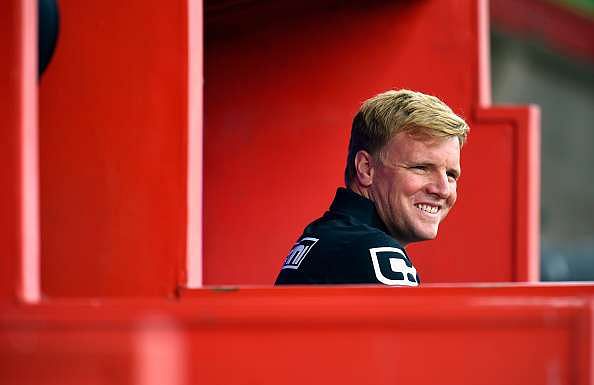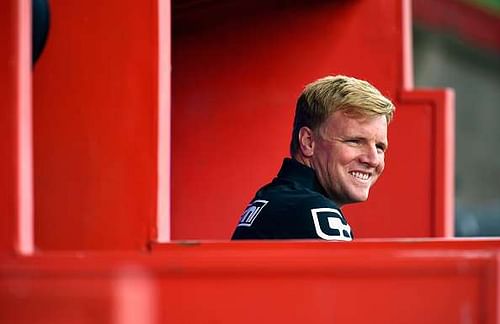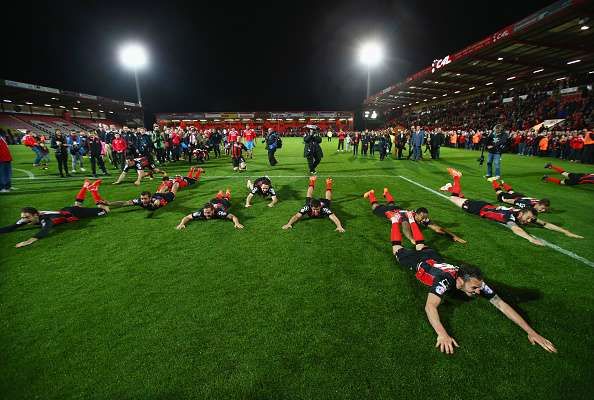
Fallacy to Ecstasy: The AFC Bournemouth story

The season of the underdog – words best describing the recently concluded English League campaign. Leicester’s meteoric rise to the champions of England has been well documented throughout and deserved plaudits meted out to their manager as well as the players. Much, if not all of the attention has been directed towards the likes of Leicester, Tottenham, and the traditionally big clubs.
A title triumph is near miraculous for a club that staved off relegation by the skin of their teeth. But there has been another club who had a miraculous season themselves but have gone about their job silently without creating much noise among the football faithful or the traditional media. No, their success has not been of the grandiose nature of the foxes, but when you consider that they went into near extinction 8 years ago, AFC Bournemouth’s inaugural campaign has been nothing short of miraculous.
Whilst a 16th place finish, with a total of 42 points for a newly promoted club isn’t unheard of. The size of the club and the odds they faced to fight to get here, make this a story worth telling.
Bournemouth, a tiny city on the south coast of England has a rich footballing history with their club being formed in the late 1800’s. However, poor management and ownership troubles drove them to near extinction in 2008. In a season where two big English clubs, Aston Villa and Newcastle saw themselves relegated, the Cherries secured safety way back in early April and were never involved in a relegation dogfight.
Rise to the Premier League
After heading into administration for a second time, the Football League gave a 17 point deduction and an 18-month transfer embargo. The club, in the lowest division of the football league, headed into 2009, 10 points off safety and relegation looming large, meaning extinction if they failed to stay up. Chairman, Jeff Mostyn, took a decision, what most people considered lunacy by appointing a 31-year-old rookie manager.
Eddie Howe, the youngest manager ever in the Football League was a product of the Bournemouth academy and had been at the club since the age of 10. Severe injuries forced him to retire at 28 and he immediately took over as reserve team manager. He was initially appointed as caretaker manager, but despite suffering defeats in his first two games, he secured the permanent position in January 2009.
Howe then took the club to safety, after they secured a dramatic 2-1 win over Grimsby on the final day of the season. The following season saw them promoted to league one. Howe was receiving rave reviews for his management and the style of play he professed. Sought after by a number of championship sides, he refused to leave the club.
Finally, in 2011, he took over championship side Burnley. With Howe’s exit, the club went back into adversity with a dismal start to the 2011-12 campaign. Hanging close to the relegation zone, the club decided to bring back their young prodigy. Howe made his return to Bournemouth in November 2012. He steadied the ship and not only ensured safety but earned them a promotion with a second place finish.

Life in the championship was not all rosy in the beginning as the Cherries could only manage a 10th place finish, 8 points off the playoff berths. Howe, a manager not known for splashing the cash was being backed by the new club owner, Maxim Denim.
Denim, a Russian oil baron, bought the club in 2011. With money available, Howe signed league one star Callum Wilson and made smart loan deals for striker Kenwyne Jones and Keeper Artur Boruc.
New additions and rise in the level of play of the existing players helped Bournemouth to a promotion to the Premier League. They went on to win the championship (2014-15), scoring 94 goals en-route. Midfielder Matt Richie finished with 15 goals and 17 assists and was voted their player of the season. Wilson would finish with 20 goals, 4th highest in the championship.
In Wilson and Ritchie, the club possessed players who had the skill and desire to make it big in the Premier League and had experience in players such as Simon Francis, Harry Arter and Adam Smith. The addition of quality in the form of Max Gradel and Tyrone Mings promised them a bright first campaign in the top flight.